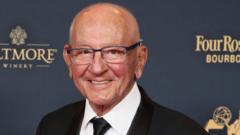The beloved US comedy institution, Saturday Night Live (SNL), is embarking on an exciting venture to reach British audiences with the announcement of a UK spin-off set to launch next year on Sky. For the past 50 years, SNL has built a legendary reputation, famous for its signature opening line, "Live from New York, it's Saturday night!" The original show has been a formidable platform for comedy legends and continues to attract A-list celebrities as guest stars.
Under the watchful eye of SNL's creator, Lorne Michaels, the new UK version aims to replicate the same rapid-fire, live sketches that characterize the American show. Yet, as the Guardian's Rachel Aroesti points out, the UK adaptation must tackle its own unique comedic landscape, which may not mirror the heritage and influence of its American counterpart. While SNL has nurtured talents including Tina Fey and Will Ferrell, the UK might struggle to match this legacy and attract high-profile guests with the same consistent appeal.
Comedienne Helen Lewis describes the decision to create a UK edition as "courageous," indicating that it will take significant effort to make it a success. Notably, the production budgets tend to be more inflated in the US, allowing for extensive teams and resources consistently devoted to the show. The differences don't stop at salary levels—cultural variances in humor are also noteworthy. British audiences may gravitate towards humor that is more subtle than the often slapstick approach that dominates American comedy.
Comedy writer Jack Bernhardt elucidates that not only are the comedic styles disparate, the foundational elements of each nation's comedy scene diverge as well. Traditionally, British sketch comedians hyphenate their craft with camaraderie at events like the Edinburgh Fringe while their American counterparts often cut their teeth in a varied array of structured improvisational setups.
SNL's legacy and enduring popularity in the US pose a stark contrast to the uncertain landscape of British television, which has witnessed significant changes, including reduced viewership. Nevertheless, despite a tumultuous decade for linear TV in the US, SNL continues to thrive, with an impressive average viewership of 8.4 million, showcasing that the sketch format is viable and appealing, even in the age of streaming.
The transition from American to British television has historically encountered hurdles; however, past attempts like Friday Night Live greatly influenced numerous British comedians, proving that a strong talent base can soar if nurtured correctly. Jimmy Mulville, a seasoned British producer, sees this as a chance to cultivate new comedic talent. He emphasizes the necessity of assembling the right blend of writers and actors who embody a truly British viewing experience.
The success of “SNL UK” hinges not solely on its acknowledged brand recognition but on delivering a unique, culturally resonant format that can engage British viewers in a way that feels innovative yet familiar. While the show's live-from-London branding holds promise, it will be imperative for the adaptation to present content that genuinely reflects British humor, steering clear of merely recycling its American inspiration.





















